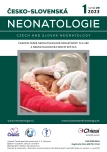Spinal muscular atrophy from the neonatologist's point of view
Authors:
M. Kozár; Z. Kuderavá; M. Zibolen
Authors‘ workplace:
Neonatologická klinika, Jesseniova lekárska fakulta UK a Univerzitná nemocnica, Martin
Published in:
Čes-slov Neonat 2023; 29 (1): 64-68.
Category:
Reviews
Overview
Spinal muscular atrophy (SMA) is a genetic and clinically heterogeneous neurodegenerative disease. In up to 95 % of cases, it is an autosomal recessive inheritable neurodegenerative disease caused by mutation of the SMN1 gene encoding a protein essential for the survival of motoneurons of the anterior horns of the spinal cord and brainstem nuclei. The disease leads to progressive muscle weakness, skeletal muscle atrophy and respiratory insufficiency, while sensory sensitivity and cognitive functions remain preserved. SMA is classified according to the age of sypmtoms onset, the highest level of achieved psychomotor development and expected life expectancy. The diagnostic standard is a molecular-genetic examination. Therapeutic options depend on the type of disease: causal treatment includes drugs that act at the genetic level and have the ability to modify the disease or slow down its progression. Support treatment is also an important part of caring for a patient with SMA. During the past year, a pilot program of newborn screening for SMA was initiated in the Czech Republic and Slovakia, the aim of which is to detect the disease at an asymptomatic stage. With early recognition and initiation of treatment, the patient's prognosis and quality of life can be significantly improved.
Keywords:
spinal muscular atrophy – hypotonic syndrome – newborn – SMA screening – SMN1 – SMN2
Sources
1. Arnold AS, Fischbeck KH. Spinal muscular atrophy. In: Geschwind DH et al. Handbook of Clinical Neurology. United States: Elsevier 2018; 591–601.
2. Balážová P, Kolníková M. Spinálna muskulárna atrofia, diagnostické možnosti a liečba. Pediatr. Prax. 2019; 20 (6): 239–242.
3. Čičová S, Oríšková E, et al. Predčasne narodený novorodenec s hypotonickým syndrómom a kryptorchizmom. Čes-slov. Pediat. 2019; 74 (5): 271–274.
4. Evrysdi (risdiplam). Prehľad o lieku Evrysdi a prečo bol povolený v EÚ [online] 2021-04-05 [cit. 2023-02-28]. Dostupné na: https:// www.ema.europa.eu/en/medicines/human/EPAR/evrysdi
5. Fidzianska A, Rafalowska J. Motoneuron death in normal and spinal muscular atrophy-affected human fetuses. Acta Neuropathologica (Berlin) 2002; 104 (4): 363–368.
6. Finkel RS, Mercuri E, et al. Diagnosis and management of spinal muscular atrophy: part 2 pulmonary and acute care, medications, supplements and immunization, other organ systems and ethics. Neuromuscul Disord 2018; 28: 197–207.
7. Glascock J, Sampson J, et al. Treatment algorithm for infants diagnosed with spinal muscular atrophy through newborn screening. Journal of Neuromuscular Diseases 2018; 5: 145–158.
8. Grotto S, Cuisset JM, et al. Type 0 spinal muscular atrophy: further delineation of prenatal and postnatal features in 16 patients. J Neuromuscul Dis 2016; 29 (4): 487–495.
9. Hamilton G, Gillingwater TH. Spinal muscular atrophy: going beyond the motor neuron. Trends Mol Med 2013; 19 (1): 40–50.
10. Knapková M, Okáľová K, et al. Nové ochorenia vhodné na novorodenecký skríning na Slovensku. Pediatr. Prax. 2020; 21(2): 52–54.
11. Kolb SJ, Kissel JT. Spinal muscular atrophy. Neurol Clin 2015; 33(4): 831–46.
12. Kolníková M, Viestová K, et al. Spinálna muskulárna atrofia: prvé skúsenosti s liečbou nusinersenom na Slovensku. Neurol Praxi 2021; 22 (2): 114–120.
13. Kraus J, Hedvičáková P. Spinální svalové atrofie v dětském věku. Neurol Praxi 2006; 1: 18–19.
14. Markowitz JA, Tinkle MB, Fischbeck KH. Spinal muscular atrophy in neonate. JOGNN 2003; 33 (1): 12–20.
15. Mercuri E, Finkel RS, et al. Diagnosis and management of spinal muscular atrophy: part 1 recommendation for diagnosis, rehabilitation, orthopedic and nutritional care. Neuromuscul Disord 2018; 28: 103–115.
16. Nicolau S, Waldrop MA. Spinal muscular atrophy. Semin Pediatr Neurol 2021; 37: 1–7.
17. Ross LF, Kwon JM. Spinal muscular atrophy: past, present and future. NeoReviews 2019; 20 (8): 437–451.
18. Singh A, Dalal P, Singh J, Tripathi P. Type 0 Spinal muscular atrophy in rare association with congenital contracture and generalized osteopenia. Iran J Child Neurol 2018; 12(1): 105–108.
19. Spinraza (nusinersen). Prehľad o lieku Evrysdi a prečo bol povolený v EÚ [online] 2017-06-21 [cit. 2023-02-28]. Dostupné na: https://www.ema.europa.eu/en/medicines/human/EPAR/ spinraza
20. Wijngaarde CA, Blank AC. Cardiac pathology in spinal muscular atrophy: a systematic review. Orphanet J Rare Dis 2017; 12: 67.
21. Zolgensma (onasemnogén abeparvovek). Prehľad o lieku Zolgensma a prečo bol povolený v EÚ [online] 2020-05-27 [cit. 2023-02-28]. Dostupné na: https://www.ema.europa.eu/en/medicines/ human/EPAR/zolgensma
Labels
Neonatology Neonatal NurseArticle was published in
Czech and Slovak Neonatology

2023 Issue 1
Most read in this issue
- Craniosynostosis
- Diagnostic dilemmas in neonatal meningitis
- Current perspective on the issue of neonatal seizures
- Appropriate management of procedural pain in newborn infants
